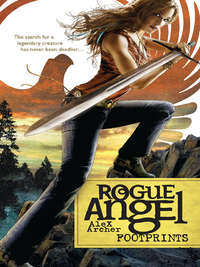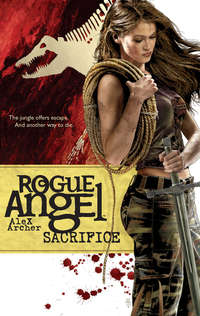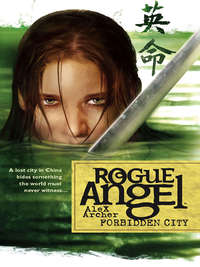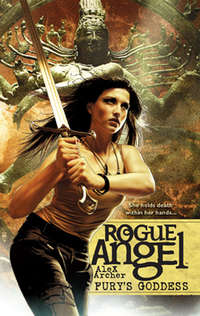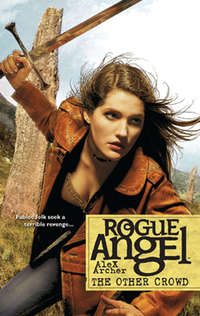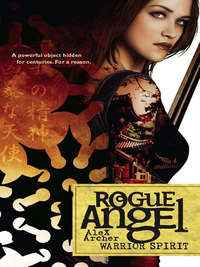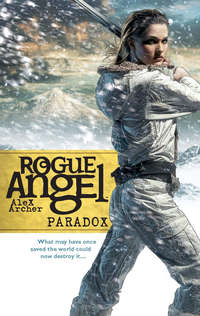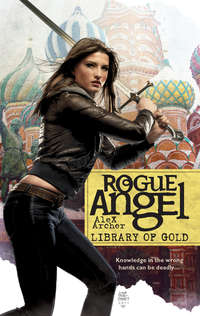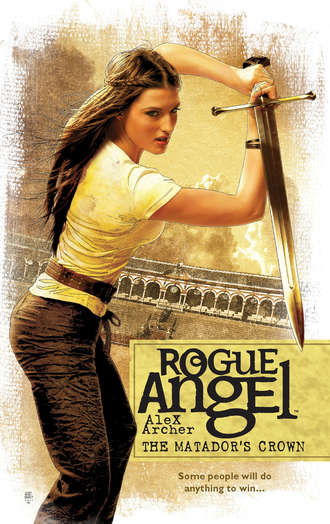
Полная версия
The Matador's Crown
The impressions in the paper packing strands of the crate indicated a round object had been inside, about three times the size of the statue, perhaps a ring like a halo. Something else could have been in the crate. Maybe the bull had been set in the center with something bigger around it.
No, it didn’t look as though the packing paper had been disturbed in the center.
Had the man on the bed been transporting stolen artifacts? It made sickening sense. Port-side cities like Cádiz were rife with small operations that trafficked in stolen and looted artifacts. Annja wanted to string them all up and force them to understand they were robbing an entire culture.
“Who was here before me?” she asked the dead man. “And what did he take from the crate?”
She was no forensics expert but could make an educated guess how long the man had been dead. His skin was pink at the bottom of his hands, which were flat on the bed, indicating the blood had settled. That meant six hours after death. He must have been murdered around midnight. It was a guess, though.
Slipping a hand inside her backpack, she drew out a digital camera and took a picture of the statue, flipping it over and getting edge shots of it as well as inner shots, trying to match the previous shots she’d taken while at the dig site. She and Harlow had uploaded those photos to their laptops. Then she snapped shots of the empty wood crate from all angles.
She wouldn’t take a picture of the dead body, but she did take another look at the man’s back to note the exact position of the wound. Set at the base of the neck and to the left of the spinal column, it looked too messy and wide for a bullet, but an exit wound could tear the flesh if the rifle had been high caliber. She adjusted her guess to a knife with a narrow blade.
She had the urge to search the dead man’s pockets for a wallet and identification except that she heard footsteps down the hallway. The door, which she hadn’t pushed closed, crept inside an inch.
Stepping out into the hallway, she spied a maid and grabbed her by the arm and said in her most theatric Spanish, “He’s dead! I was going into my room, and his door was open. Send for the police!”
2
Annja had waited until a pair of officers had arrived at the hotel, and answered their brief questions. They’d asked her to come along to the Cádiz city police station.
She relayed all the information she could to a Maria Alonzo—a female officer Annja decided wasn’t in a high position. She merely nodded and jotted things down and didn’t prompt with leading questions. The officer then said she’d return with Annja’s belongings in a few minutes and left the room.
Having been escorted to an interrogation room upon arrival at the police station hadn’t bothered Annja. Of course they would be thorough. And, having been on the scene, she could understand how she might be construed a suspect. But she wasn’t going to sit patiently for long.
She still had one more day at the museum planned, working alongside James Harlow. The murder mystery she would leave in the capable hands of the Cádiz police. But the question of what had been inside the wooden crate tread on her turf. And whatever it was had been worth murder to someone.
It wasn’t related to the bronze statue, she suspected. Or else wouldn’t the murderer have pocketed that, as well? There was a possibility whatever had been stolen wasn’t even an artifact. But the crate and the packing materials screamed archaeological interest.
She got up from the uncomfortable metal folding chair and stretched her arms over her head. Despite its seaside location, the heat index could rise to blistering before noon and the room didn’t have air-conditioning. She had waited an hour alone in this room before an officer had arrived to get the details from her. She was hungry, yet her system buzzed with nervous adrenaline.
“Señorita Creed?”
A second officer strolled in, favoring his left leg with a slight limp. He set her heavy canvas backpack on the table. He stood back, thumbs hooked into the front pockets of his brown, creased slacks. He wore the force’s green flak jacket with the gold policia emblem emblazoned across the back over a yellow-and-blue-striped shirt. Visible under his left arm, a holstered pistol. The big silver buckle of his belt was either a black enameled bucking horse or a bull. Annja couldn’t be sure and didn’t want to look too closely.
“César Soto,” he offered, but didn’t offer his hand. “Chief Inspector, Cádiz PNP.”
He wore a nonissue beige cowboy hat low over his brow, which emphasized his dull, black eyes. He needed a shave, and sweat slicked his cheeks and nose.
“Am I free to leave?” she asked, fingering the backpack strap. “I answered all the other officer’s questions.”
“Just a few more minutes, if you don’t mind, Señorita Creed.” He spoke English well, with only a hint of a Spanish accent. “My assistant is typing up her report, but I wanted to go over a few key points with you that I don’t quite understand.”
He pulled a credit-card-size digital camera out of his jacket pocket and set it on the table. It was her camera. Annja picked it up and turned it on.
“We uploaded and then erased the contents,” Soto said before she could verify that for herself. “Tell me why a woman who happens upon a murder scene moments after renting a room in a hotel takes pictures of the incident.”
“I didn’t photograph the victim.” She winced. As if that made her amateur-photography expedition sound more virtuous. “I’m an archaeologist, Officer Soto. I explained to your assistant, when I arrived at my room the door next to mine was open, and I am, by nature, curious.”
“And apparently quite brave to walk in on a dead man?”
“I’m also accustomed to dead bodies.”
“Is that so? How often do you come across a fresh kill?”
More often than she was willing to reveal.
“Not often,” she offered carefully. “I’ve learned to view the scene with an unemotional eye for detail. I hadn’t expected to see an item on the man’s dresser that I had touched less than twenty-four hours earlier.”
“The bronze bull we’ve taken into evidence?”
“Yes. It’s possibly a statue of Baal, the bull god of thunder and rain. A fertility god.”
“And you dug that up at a dig site near Jerez?”
“Puerto Real, yes. Professor Jonathan Crockett’s dig. I’ve given the officer this information. So, yes, at the time, it felt natural to photograph the evidence.”
“You Americans are a strange breed.” Soto shifted his jaw and a bulge pushed out his cheek. Annja figured he had chewing tobacco and now noticed the leathery scent that surrounded him like a rancid perfume. “You ever work forensics?”
“No. But I’ve worked alongside professionals from the field. I know it sounds odd, but trust me, it was an innate reaction to take out my camera.”
“With a dead body lying feet away. Yes, I’d mark that as odd, for sure. If not suspicious.”
“He was dead before I arrived, Officer Soto. Even without a forensics background I could determine that, as I’m sure your investigating officers also did.”
“You didn’t take any pictures of what had been in the crate?”
“There wasn’t anything in the crate when I arrived.”
“You could have removed evidence.”
“I didn’t take anything. I give you my word.”
His forehead lifted in a dark chevron beneath the hat brim. He didn’t know her from a tourist. Or a thief, for that matter.
“Who was the man, if I can ask?”
Soto studied her with slow calculation. “He was a guitar player from a local club.”
“His name?”
“That’s not public information.”
She nodded. It had been worth a shot.
“Although, you’ll learn soon enough. It has already leaked to the press.” He eyed her as if she’d just spat at him. The tobacco bulge shifted from one cheek to the other. “I hate the press and all forms of media.”
“They have a job to do. I’m sure they can’t all be bad.”
He winced and again shifted the tobacco to the other cheek. “You some kind of movie star?”
The thought process that had generated such a question baffled her. She hadn’t mentioned her work with Chasing History’s Monsters to the other officer. Even so, hosting the cable television show hardly qualified her as a movie star. “Why do you ask?”
“I did a search for you on the internet. Something about a monster chaser came up.”
Good old Google.
“It’s a cable television show that explores the facts behind monsters, legends and other myths throughout history,” she explained. “I am one of the hosts. As an archaeologist, I offer a unique perspective. But I am far from what you’d consider a movie star. What does the television show have to do with this case?”
“Just wondering what sort of publicity is going to develop if you start opening your mouth.”
“I—” That had been a clear threat. She could feel his condemning stare penetrate her skull. “I’ve no intention of speaking about this to anyone. I’m hardly in a position to be doling out details on a murder case. In fact, I’m headed out of town soon. I’ve been working with the city museum, looking over a recent acquisition of Greek coins found in Egypt. In another day I’ll have all the notes I need for my project, and then I’ll hop a flight back to New York City.”
“Then I wish you a good journey.” He tipped his hat to her. “Thank you for the information, señorita. Please give your contact phone number and the location you’ll be staying at after leaving Cádiz with my secretary. You are witness to a crime scene, you understand.”
“Of course.” She slung the backpack over her shoulder and offered her hand to Soto, which this time he shook. “Luck with the case.”
After speaking with the secretary and signing the report of the information she’d given, Annja pulled out her cell phone and dialed Roux. It was a spur-of-the-moment decision. The man had connections worldwide. She recalled listening to him and Garin wax over their visits to Spain in the 1950s and how they’d loved the country and the bullfighting. As well, the man was interested in art and antiquities, so she figured he might have some connections.
His phone rang over to an answering machine, which surprised her. Usually the former soldier—fifteenth-century soldier, to be accurate—had a cell phone on him. She had no idea where in the world he could be right now. But if he was at his Paris château, they were in the same time zone.
She tucked her phone away and decided to try back later.
Foregoing a return to her hotel room—surely the police would still have the dead man’s room marked off—she headed toward the Cádiz city museum on the Plaza de Mina. But a block away from the museum, James Harlow waved her down on the sidewalk and redirected her to a nearby tapas bar.
James Harlow was a slender man in his fifties who walked with a cane, due to an injury to his hip he’d never explained to Annja. He dressed in Oxford plaids and bespoke leather shoes, and had a habit of checking his watch with a tap to the crystal face.
Inside the cool bar, with walls painted blue and wicker ceiling fans, Annja ordered lemon water from the waitress. Harlow followed that up by ordering lunch for the two of them. The tortitas de camarones sounded delicious.
Harlow hooked the cherrywood cane on the edge of the table and leaned on his elbows toward her. “You’re getting a late start this morning, too, I see.”
“Not by choice. I spent the morning at the police station.”
“The police station? I’ve heard the hostels tend to have some wild parties, but, Annja, what were you up to?”
She liked that he joked with her so easily. No professional rivalries between the two of them.
“I decided sleep was more valuable than partying, so this morning I checked into a place I thought would prove more restful. But in the room next to mine I found a man who had been stabbed to death.”
“Are you serious?” He sat back in his seat and stared at her. “What are the odds of that? You do have a manner of sniffing out intrigue wherever you go.”
He’d confessed to following her adventures on Chasing History’s Monsters, but that show was just the tip of the iceberg with Annja Creed. The man couldn’t possibly be aware of all the adventures that had demanded she wield a sword to save innocent lives.
“Must be the young man I heard about on the radio twenty minutes ago,” he said. “A guitar player?”
“Yes. Did they mention his name?”
“Uh, Diego someone. Montera? That could be it. I noted it because I think there’s a family of toreros by that name. It’s also what they call the hat a matador wears in the ring, a montera. So, someone didn’t like his music?”
“Well, there was a stab wound in his back, but I won’t make a judgment call on his talent.”
Harlow choked on his beer. He set the mug down on the napkin and, face tight, smoothed the napkin out neatly to each corner before tapping his watch. “I’m so sorry, Annja. Finding a dead body is certainly not the best way to start the day. What the hell happened?”
“Someone killed him for an artifact.”
“Is that so? How do you know?”
“Listen, this is privileged information and the police are handling the case, but...”
“A mystery? Tell me.”
“There was a wooden crate in the room, and whatever had been inside it was gone. I suspect the murderer stole it. I also suspect it was an artifact, though I can’t be sure. I took pictures, but the police erased them from my camera.”
“Bold. On both your parts.”
“You’ve still got the pictures you transferred from my cell phone, right?”
“Of the bronze statue.”
“Great.” She paused. “There was another artifact that wasn’t stolen. One I actually unearthed a day ago.”
“What? You don’t mean...”
She nodded. “The bronze bull statue.”
“But how? You just discovered that on Crockett’s dig.” The man wiped a hand over his face and shook his head. “Damned looters.”
“That has to be the case. Someone looted Crockett’s site and made a quick turnaround, hoping to sell it. But apparently Diego Montera was carrying something of even more interest and value if his killer left the statue behind.”
“Which would give one reason to assume what was stolen was more valuable,” Harlow deduced. “Where’s the Baal statue now?”
“In the police evidence locker room, I’m sure. I handled it, with gloves on, and took pictures, but—”
“You should have slipped it into a pocket, Annja. That piece was an awesome little find.”
She hadn’t thought it so remarkable, but then remembered his interest in bull artifacts.
“It’ll run through the system eventually. You’ll get your hands on it sooner or later, I’m sure.”
“Don’t bet the farm on that one. Police evidence tends to find its way to the University of Cádiz on the mainland. Damned Edmond Rogers, head of acquisitions, will have his hands all over the thing before I will. That they get first dibs at police seizures is such a bloody crock. They don’t even have an archaeological department. Their focus is marine studies.”
“Well, you’ve still got the picture I took on-site.”
He nodded and looked aside, wincing. Disappointed, surely. But what could either of them do? Annja didn’t make it a habit to steal police evidence. Not that she hadn’t done so before; she just wouldn’t call it a habitual thing.
“I’m going to look into it,” she said. “If the site was looted, and the artifacts were turned around in less than a day, that tells me there’s an illicit antiquities operation in town.”
“There are likely many operations in town. This is a seaport.”
“True. I’ve got to call Jonathan Crockett. Or rather, I think I’m going to head out there after we’ve eaten.”
“You’ve more work at the museum. You think you have time to do that?”
Annja tilted her head at the man. “Professor, I’m surprised. This reeks of everything I thought you abhorred. I thought the museum took a hard stance against acquiring items without provenance?”
“Damn it,” he said softly. Clasping the mug, he stared out the window at passing tourists. After a few moments, he swung a look at her. “Annja, forgive me. I’m being absolutely rude. You must be in a state to have found a body. Are you okay?”
“Sure. Nothing I haven’t—” She cleared her throat and took a long swig of the cool lemon water. “I’m fine.”
“I’m sure you’ve seen things,” he said. “But as archaeologists we usually find the bodies long after death, and that involves little blood or gore.” He reached across the table and laid a hand over hers. “If you need to talk, I can take the rest of the afternoon off.”
She appreciated his kindness. His reputation as being a hardnose had never been apparent to her. “Thank you, James. But I really am fine. And I am going to drive out to Crockett’s site, so I won’t be at the museum this afternoon. Is it all right if I stop in tomorrow to finish my work with the coins?”
“Of course.” He rubbed a hand along his thigh, the wounded leg, she assumed. He’d mentioned he felt constant pain, yet was able to bypass painkillers by using visual relaxation. “Yes, you’re right. Spain’s cultural heritage is not a renewable resource. If illicit trade is going on in the city, it’s our responsibility to put a stop to it. Now that I think on it...perhaps you’ll want to take a closer look at Jonathan Crockett. He’s a retired college professor who can’t find funding for a big-time dig so he’s taken what he can to keep his fingers in the dirt. A man like that...you never know what he’d do for cash.”
Annja didn’t know Crockett well, but the few days she had worked alongside him, she hadn’t gotten the murderer vibe from him. Or the I-will-sell-potsherds-for-cash vibe, either. But she wouldn’t assume anything right now.
“You worked with him?”
“It’s been over a decade, but we headed a dig together in Egypt along the Nile valley. I had to keep an eye on him. Finds went missing that I couldn’t prove.”
“Thanks, I’ll keep that in mind.”
The waitress arrived with two steaming-hot plates. Annja dug into the thin omelet stuffed with onions and tiny prawns.
The professor studied her intense enjoyment for a few moments, smiling before diving in himself. So she was a hearty eater. It was always wise to eat her fill whenever she was around food, because there were long times when she wasn’t able to eat. Either because of her work schedule, travel or, more often, because of mysterious dealings that involved her stowing away in a ship’s hull or battling gunrunners or falling into a pit in the middle of the Sahara Desert.
After they’d eaten, with a promise to stay in contact with Harlow regarding details of the case, Annja stepped out of the tapas bar into the searing summer sun, courtesy of the god Mot. Glancing to the left, she spied the sea and a beautiful white-sand beach littered with bikini-clad women and children. Out on the water a windsurfer cut through the silver waves.
And then she saw the tall, broad-shouldered man leaning against a metal street pole pasted with posters for flamenco dance concerts. Arms crossed high over his broad chest, and a smirk softening his square face from its usual steel to the lesser iron, his presence wasn’t as much of a surprise as it should’ve been.
“Garin Braden,” she muttered, not in an altogether welcoming tone. She’d decide soon enough if she was pleased, indifferent or just plain offended to see the man.
3
“Surprised?” Garin asked in Spanish, waiting for her to approach, which Annja did with forced disinterest. He looked abnormally vacationy in his pale cream linen suit and straw fedora. Garin presented her with a different side of himself each time she ran into him.
Annja replied, using the local dialect, “I’m never surprised that you always seem to know exactly where I am at any given time. It’s your innate Annja radar, right?”
“Something like that.” His dark eyes, shaded by the hat, held hers. Annja didn’t flinch. “Also not a surprise to learn you were in a building of authority earlier.”
“That would be what most people call a police station.”
Likely, it wasn’t innate radar but rather GPS coordinates Roux had gotten from her earlier call. And he’d already let Garin know about it? Interesting. The two men didn’t work together unless there was something in it for both of them.
“Is that so? And here I thought my Spanish was so good.” He switched to English. “So what adventures have you been up to? Slaying bad guys? Leaping tall buildings in a single bound? Chasing after dusty old pots?”
She walked along the stretch of stucco and brick buildings fronting the beach and he paralleled her. “I have a feeling I don’t need to answer that one. You already know why I’m in Cádiz. Actually, I’d be disappointed if you didn’t.”
“I confess I do know the reason you were at the police station. That sort of information just comes to me, you understand. My people keep a keen eye out for threats, danger and—”
“I’m a threat?”
“No, you fall squarely in the Persons of Interest category.”
“Of course.” He did, too. Sort of like an ancient Grecian urn was interesting to her. “So Roux is one of your people?”
“When it serves me.”
The sidewalk narrowed and the big man’s arm brushed hers as they walked. He was a good head higher than her five foot ten inches—probably pushing six-four—and his shoulders were as broad as the toro bravo they bred for the bullfight here in Spain. Annja mused that he even possessed all the qualities matadors looked for in a bull: aggression, strength, stamina and intelligence. He was also several centuries old, which made him irresistible to her. And that offended her moral need to remain aloof toward the man.
“Headed anywhere in particular?” he asked.
“Off this sandspit to Puerto Real, to a little dig tucked on the edge of town.”
“Ferdinand and Isabella’s town,” he commented.
Annja searched historical dates in her head. Puerto Real had been founded by King Ferdinand II of Aragon and Isabella I of Castile near the end of the fifteenth century. Garin had been walking this earth since the early fifteenth century.
Okay, she’d give him that one.
“The town has been around since before the Romans,” she said. “Ferdinand made it a royal port to lure trade from North Africa his way.”
“He was not a stupid king. And his wife was hot.” He gestured to the black Jeep parked ahead. “I’ll give you a ride. It’ll give us an opportunity to catch up.”
Blinking into the sun, Annja agreed she did want to catch up—and learn what Braden knew about her latest adventure. Even if she didn’t trust the man as far as she could toss him. And with his bulk, that was more like a drop down her body before she sprained a wrist.
Sliding into the Jeep’s passenger seat, she buckled up and tossed her backpack into the open truck bed. She hadn’t missed the dried mud on the wheel rims and quarter panels. “You doing some off-roading in the area?”
“Rained yesterday.”
“Sure. And that pitiful sprinkle managed to splatter your rearview mirror with mud.”
“You got it.”
Garin probably fancied himself an international man of mystery—which he was—but Annja knew he used the persona around her only when he wanted to tease her. On the other hand, he had secrets. Lots of them. And sometimes it was better to let things slide than to question them.
Garin eased into traffic and headed toward the ancient defensive walls that had circled the city since Roman times. Gadir, the name the Phoenicians had given the original outpost, meant “walled stronghold.”
They didn’t speak as Annja took in the scenery. Two massive electricity pylons hugged either side of the Bay of Cádiz as they neared La Pepa, the bridge that accessed the mainland. It was one of the longest cable-span bridges in the country. On the pylons, steel framework supported electric power cables. She wondered with amusement how long before Wi-Fi and satellites obliterated the need for such things.


